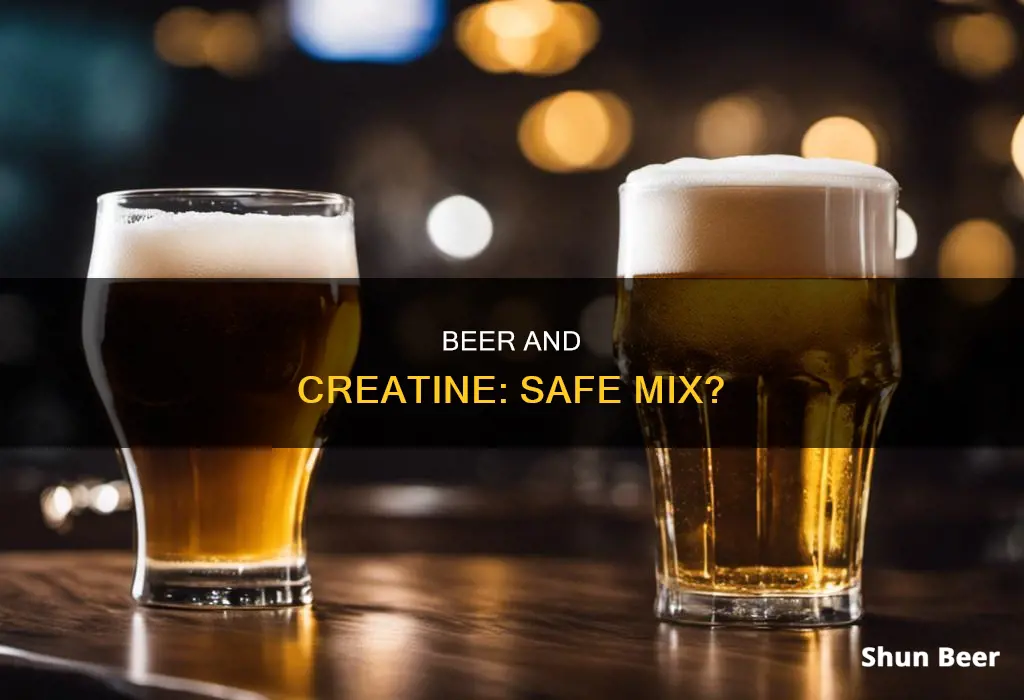
Creatine is a performance booster that supplies energy, supports muscle growth, and aids in post-workout recovery. It is a type of amino acid found mostly in skeletal muscles and is made in the liver, kidneys, and pancreas. On the other hand, alcohol has been shown to negatively impact muscle building and recovery. It hinders the process of protein synthesis and affects the anabolic properties of insulin and growth hormones. While there is no official study on the effects of mixing creatine and alcohol, it is clear that they work against each other. Alcohol may also cause muscle breakdown, as it hinders the muscle rebuilding process. Additionally, alcohol interferes with nutrient absorption, including protein and amino acids, which are essential for muscle growth and recovery. Therefore, it is generally recommended to avoid mixing creatine and alcohol to maximize the benefits of creatine supplementation.
| Characteristics | Values |
|---|---|
| Effect on muscle building | Alcohol hinders the process of protein synthesis, which is essential for muscle growth and development. |
| Effect on anabolic properties | Alcohol adversely influences the anabolic properties of insulin and growth hormone. |
| Effect on muscle recovery | Alcohol slows down muscle repair and the recovery process. |
| Effect on energy levels | Alcohol reduces reaction time, stamina, strength, power and speed. |
| Effect on injury risk | Alcohol increases the risk of injury. |
| Effect on hydration | Alcohol is a diuretic and can cause dehydration. |
| Effect on hangovers | Alcohol and creatine can worsen hangovers. |
| Effect on organ function | Alcohol affects kidney and liver function. |
What You'll Learn

Alcohol may cause muscle breakdown
Alcohol has two very negative effects on muscle building. Firstly, alcohol hinders the process of protein synthesis, which is the production of new muscle proteins and, therefore, muscle growth. Secondly, alcohol affects the anabolic properties of insulin and growth hormones, both of which are essential for inducing protein synthesis after physical exercise.
In addition, alcohol decreases protein synthesis in fast muscle fibres, which are called into play when undertaking explosive movements such as heavy lifting and sprinting. This is important because creatine increases the work output of fast muscle fibres. Therefore, fast muscle recovery is more critical during creatine supplementation.
Chronic alcohol consumption can also lead to protein-calorie malnutrition, which frequently results in a negative nitrogen balance, reduced nutrient intake and malabsorption of nutrients. This can lead to vitamin deficiencies, including folate, thiamine, vitamin B6, zinc and iron.
Finally, alcohol can cause rhabdomyolysis, a potentially life-threatening condition where alcohol causes muscle tissue to break down and release into your blood.
Beer and Tylenol: Safe Mix or Health Risk?
You may want to see also

Alcohol negatively impacts muscle protein synthesis
Secondly, alcohol induces insulin resistance. Insulin is a potent stimulator of muscle growth and is responsible for the absorption of carbohydrates into muscles. With limited absorption ability, muscle growth and recovery are impaired. Insulin resistance can also lead to increased tissue breakdown if levels are elevated for long periods.
Thirdly, alcohol affects the production and release of anabolic hormones such as growth hormone and insulin-like growth factor-1 (IGF-1). These hormones are essential for inducing muscle protein synthesis after exercise. Alcohol causes insulin resistance, hinders the release of growth hormone from the brain, and reduces IGF-1 levels. These combined effects slow muscle development and mitigate the response to creatine.
In summary, alcohol creates a biochemical environment that undermines the benefits of creatine and other supplements. It decreases muscle protein synthesis, causes insulin resistance, and interferes with the release of anabolic hormones. These effects can be particularly damaging for athletes trying to gain muscle mass and strength through training. Therefore, if you are serious about maximising muscle growth and strength gains, it is advisable to abstain from alcohol or drink in strict moderation.
Beer Drinking and Heart Palpitations: Is There a Link?
You may want to see also

Alcohol slows you down
Alcohol also slows down muscle repair and recovery, as it interferes with the absorption of essential nutrients, such as protein, vitamins, minerals and macronutrients. This can also increase your risk of injury, as your body is unable to perform optimally.
Alcohol also slows down the process of protein synthesis, which is essential for muscle growth and development. It also affects the anabolic properties of insulin and growth hormones, which are essential for inducing protein synthesis after physical exercise.
Finally, alcohol can cause dehydration, as it is a diuretic. This can be dangerous for muscle function, as proper hydration is key for the optimal absorption of creatine.
Beer and Dark Stool: Is There a Link?
You may want to see also

Alcohol can increase your risk of injury
Secondly, alcohol can cause a faster occurrence of muscle fatigue. This is due to its negative impact on the absorption of key nutrients, such as calcium, magnesium, iron, zinc, and B vitamins, which are vital for athletic performance. When the body is unable to absorb these nutrients properly, it cannot perform optimally, increasing the risk of injury.
Thirdly, alcohol slows down muscle repair and the recovery process. This is because alcohol reduces reaction time, stamina, strength, power, and speed for up to three days after consumption, according to the National Collegiate Athletic Association (NCAA). This sluggishness can make you more susceptible to injuries.
Finally, regular drinking can impair immune function and inhibit healing, as per the NCAA. This means that drinking alcohol can increase your susceptibility to injuries and prolong the recovery process.
Booster Shot and Beer: What's Safe?
You may want to see also

Alcohol can worsen dehydration
Alcohol is a diuretic, which means it can cause dehydration if you don't consume enough water and sodium before, during, and after drinking. Dehydration can lead to uncomfortable symptoms like muscle cramps, which are not ideal before a workout. Severe dehydration can be dangerous and requires immediate medical attention. Symptoms include diarrhea for 24 hours or more, irritability or disorientation, excessive sleepiness, and difficulty keeping down fluids.
Proper hydration is essential for the optimal absorption of creatine. When you're dehydrated, your body's balance of sodium is disrupted, and this affects how well your body uses creatine. Sodium acts as a transporter of creatine into muscle tissue, so when you're dehydrated, creatine is not as effectively transported and absorbed.
Drinking alcohol may lead to dehydration, which, when combined with potential dehydration from not drinking enough water during and after workouts, can negatively impact your athletic performance. Alcohol can also increase the severity of hangovers, which are already partly caused by dehydration.
To avoid dehydration, it's important to stay properly hydrated and fueled when taking creatine and drinking alcohol. This means consuming adequate water and macronutrients to support your training demands. It's also crucial to drink in moderation, sticking to no more than one to two drinks daily.
Is Budweiser Beer Gluten-Free? Safe for Celiacs?
You may want to see also
Frequently asked questions
While there is no direct interaction between creatine and alcohol, drinking beer while taking creatine may reduce its effectiveness. Alcohol can cause dehydration, impair muscle growth and recovery, and affect the organs that produce creatine, such as the liver and kidneys. Therefore, it is generally recommended to avoid drinking alcohol while taking creatine supplements.
Yes, alcohol can affect the absorption and utilization of creatine by the body. Alcohol can cause dehydration, which is necessary for optimal creatine absorption. Additionally, alcohol can impair the normal functions of the body, including digestion, which may decrease the absorption of creatine and other nutrients.
It is not recommended to drink beer or any alcoholic beverage before or after working out while taking creatine. Alcohol can slow down muscle recovery and repair, increase the risk of injury, and negatively impact athletic performance. It is best to avoid alcohol, especially around your workout times, to maximize the benefits of creatine supplementation.
Drinking beer or any form of alcohol can hinder muscle growth and protein synthesis, which is essential for building and repairing muscles. Alcohol can also interfere with the anabolic properties of insulin and growth hormones, which are crucial for muscle development. Therefore, drinking beer may counteract the muscle-building benefits of creatine supplementation.
Combining creatine and alcohol may increase the risk of liver damage, especially with excessive alcohol consumption. Alcohol can also cause dehydration, muscle cramping, and pain. Additionally, alcohol can affect coordination and muscle movement, even after you have sobered up. It is important to consult with a healthcare professional before taking creatine, especially if you have any liver or kidney conditions.







